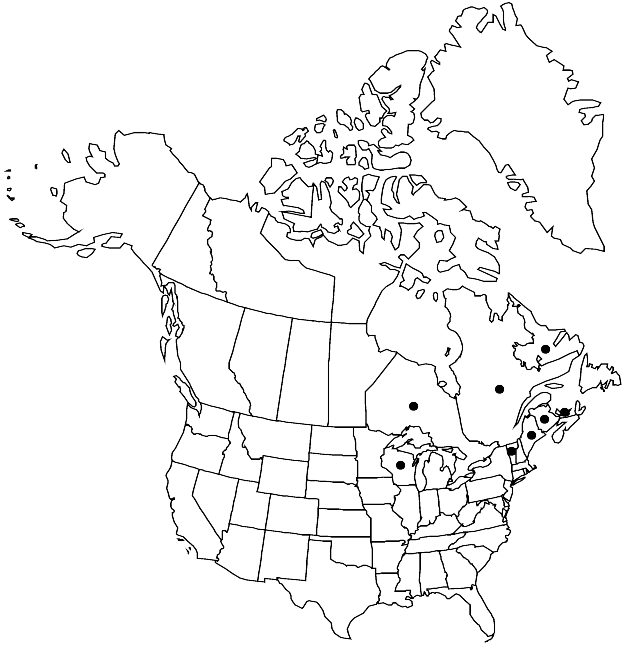Difference between revisions of "Sciuro-hypnum starkei"
Arctoa 11: 270. 2003.
FNA>Volume Importer |
FNA>Volume Importer |
||
| Line 28: | Line 28: | ||
|elevation=low to moderate elevations (100-1300 m) | |elevation=low to moderate elevations (100-1300 m) | ||
|distribution=N.B.;Nfld. and Labr. (Labr.);Ont.;P.E.I.;Que.;Maine;Vt.;Wis.;n Europe;n Asia. | |distribution=N.B.;Nfld. and Labr. (Labr.);Ont.;P.E.I.;Que.;Maine;Vt.;Wis.;n Europe;n Asia. | ||
| − | |discussion=<p>Sciuro-hypnum starkei is easy to confuse with Bryhnia novae-angliae and Kindbergia praelonga. From Kindbergia the species differs in its less regular pinnate branching, less well differentiated stem and branch leaves, and acute pseudoparaphyllia; in Kindbergia, pseudoparaphyllia are long-acuminate, so groups of them around the branch primordia are quite conspicuous; they are usually quite numerous and some authors called them paraphyllia. Differences from B. novae-angliae include consistently triangular stem leaves (in Bryhnia they are highly variable, with leaves in proximal part of branches shorter and acute to rounded) and percurrent costae (in Bryhnia they end mid leaf). From both Bryhnia and Kindbergia, S. starkei differs in its autoicous sexual condition.</p> | + | |discussion=<p><i>Sciuro-hypnum starkei</i> is easy to confuse with <i>Bryhnia novae-angliae</i> and <i>Kindbergia praelonga</i>. From <i>Kindbergia</i> the species differs in its less regular pinnate branching, less well differentiated stem and branch leaves, and acute pseudoparaphyllia; in <i>Kindbergia</i>, pseudoparaphyllia are long-acuminate, so groups of them around the branch primordia are quite conspicuous; they are usually quite numerous and some authors called them paraphyllia. Differences from <i>B. novae-angliae</i> include consistently triangular stem leaves (in <i>Bryhnia</i> they are highly variable, with leaves in proximal part of branches shorter and acute to rounded) and percurrent costae (in <i>Bryhnia</i> they end mid leaf). From both <i>Bryhnia</i> and <i>Kindbergia</i>, <i>S. starkei</i> differs in its autoicous sexual condition.</p> |
|tables= | |tables= | ||
|references= | |references= | ||
| Line 51: | Line 51: | ||
|publication year=2003 | |publication year=2003 | ||
|special status= | |special status= | ||
| − | |source xml=https://jpend@bitbucket.org/aafc-mbb/fna-data-curation.git/src/ | + | |source xml=https://jpend@bitbucket.org/aafc-mbb/fna-data-curation.git/src/8f726806613d60c220dc4493de13607dd3150896/coarse_grained_fna_xml/V28/V28_716.xml |
|genus=Sciuro-hypnum | |genus=Sciuro-hypnum | ||
|species=Sciuro-hypnum starkei | |species=Sciuro-hypnum starkei | ||
Revision as of 17:07, 18 September 2019
Plants medium-sized, rigid, in loose tufts, green to yellow-green. Stems to 4 cm, creeping to ascending and almost erect, flexuose, curved near apices, terete-foliate, regularly pinnate, at least in part, branches to 7 mm, often curved, terete- to complanate-foliate. Stem leaves erect- to wide-spreading, not crowded, ovate-triangular, slightly concave, not plicate, 0.8–1.6 × 0.4–0.8 mm; base narrowly long-decurrent; margins plane or recurved proximally, serrulate; apex gradually tapered or rarely short-acuminate; costa in most leaves percurrent or vanishing within narrow acumen, occasionally before mid leaf, strong, terminal abaxial spine present; alar cells enlarged, to 25 × 17 µm, walls thin, region conspicuous, pellucid; laminal cells elongate to linear, 40–75 × 5–7 µm, smooth or distal cells occasionally prorate; basal juxtacostal cells not clearly differentiated, shorter, slightly broader than laminal cells, region in 2 or 3 rows. Branch leaves ovate to ovate-lanceolate; base symmetric or rarely asymmetric; margins plane, more strongly serrulate to coarsely serrate; costal terminal spine absent, or occasionally abaxial spine and several abaxial teeth present; distal laminal cells prorate. Sexual condition autoicous. Seta reddish, 1.2–1.6 cm, rough. Capsule horizontal to pendent, reddish, oblong, curved, especially when young (sometimes forming 180–270° arch), 2 mm. Spores 12–16 µm.
Habitat: Soil, rich humus, wet places, swamps, forests
Elevation: low to moderate elevations (100-1300 m)
Distribution

N.B., Nfld. and Labr. (Labr.), Ont., P.E.I., Que., Maine, Vt., Wis., n Europe, n Asia.
Discussion
Sciuro-hypnum starkei is easy to confuse with Bryhnia novae-angliae and Kindbergia praelonga. From Kindbergia the species differs in its less regular pinnate branching, less well differentiated stem and branch leaves, and acute pseudoparaphyllia; in Kindbergia, pseudoparaphyllia are long-acuminate, so groups of them around the branch primordia are quite conspicuous; they are usually quite numerous and some authors called them paraphyllia. Differences from B. novae-angliae include consistently triangular stem leaves (in Bryhnia they are highly variable, with leaves in proximal part of branches shorter and acute to rounded) and percurrent costae (in Bryhnia they end mid leaf). From both Bryhnia and Kindbergia, S. starkei differs in its autoicous sexual condition.
Selected References
None.